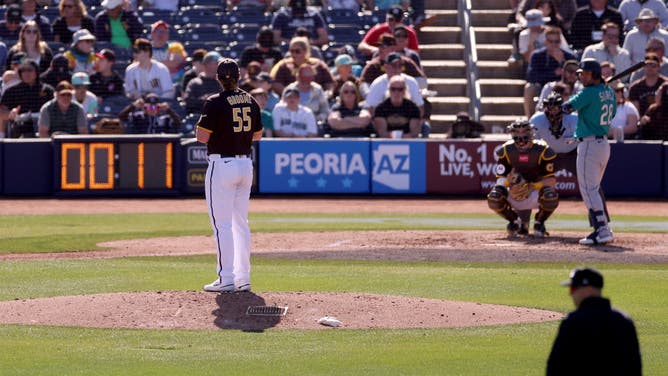Braves-Red Sox Game Ends in Tie Due to Pitch Clock Violation
MLB’s new pitch clock has already decided the outcome of a game.
This comes just one day after the first pitch clock violation cost Manny Machado a ball during Friday’s Padres-Mariners game.
READ: WE ALREADY HAVE OUR FIRST PITCH CLOCK VIOLATION OF THE 2023 MLB SEASON
Saturday’s violation was much more impactful, however.
The Atlanta Braves and Boston Red Sox were tied 6-6 in the bottom of the 9th inning, with the bases loaded for the Braves.
The count ran full with two outs, making it effectively a game deciding pitch, in a spring training contest.
Braves hitter Cal Conley took his time getting set in the box, and was called out on strike three on the pitch clock violation.

PEORIA, ARIZONA - FEBRUARY 24: A pitch clock counts down as Jay Groome #55 of the San Diego Padres prepares to deliver a pitch to Eugenio Suarez #28 of the Seattle Mariners during the sixth inning in a spring training game at Peoria Stadium on February 24, 2023 in Peoria, Arizona. (Photo by Steph Chambers/Getty Images)
Pitch Clock Causing Problems
MLB’s changes have already made a significant difference on game times.
Friday’s games finished in roughly two and a half hours, a vast improvement over the three plus hour average length of games in 2022.
But there are almost certainly going to be arguments and attempts to game the clock system this season.
If it’s left up to umpire discretion on who’s responsible for the delay, managers and players could be incensed if major game situations are decided based on subjective violation decisions.
Spring training games are obviously meaningless, but what happens if a meaningful division game, for example, is decided by a game ending pitch clock call?
The desire to speed up the games is going to lead to some speed bumps, as teams, players and umpires adjust to a new system.
But based on the results so far, the clock is undoubtedly improving pace of play and making the games move faster.
It’ll just be fascinating to see what happens if a playoff game gets decided by a hitter taking too long to get in the box.